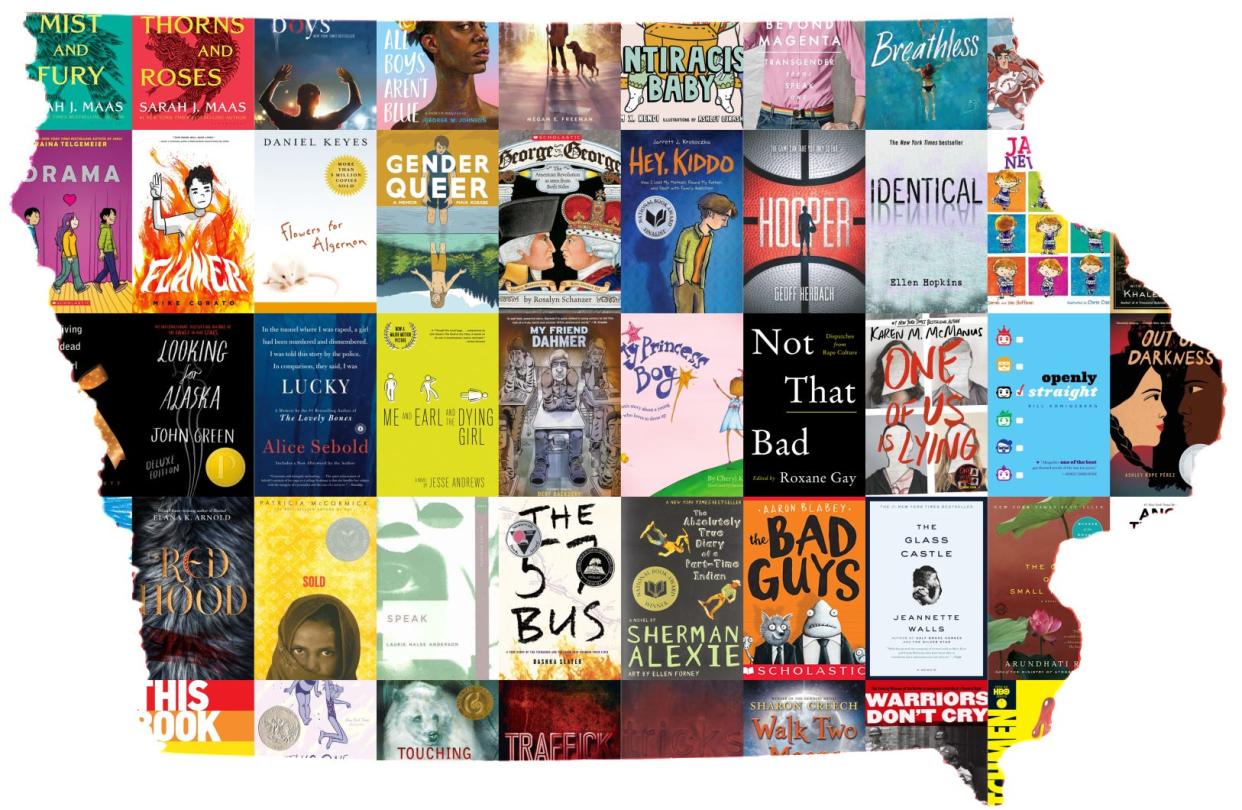Penalties for teachers who violate Iowa's book ban law take effect Jan. 1

Editor's note: On Dec. 29, U.S. District Court Judge Stephen Locher granted an injunction blocking enforcement of most of Senate File 496, including the portions requiring schools to remove books depicting sex acts and prohibiting instruction about gender identity or sexual orientation in kindergarten through sixth grades.
As school administrators and educators return to work in the new year, new penalties will go into effect for a sweeping education law that bans some books from classrooms and libraries.
The potential penalties begin at a time when guidance from the Iowa Board of Education on how to determine which books violate Senate File 496 is likely still weeks away.
Here is everything we know about the impact of Senate File 496 as teacher penalties go into effect Jan. 1.
What is Senate File 496?
Senate File 496, Iowa Republicans' far-reaching education bill, bans almost all books with sex acts from schools and forbids curriculum and instruction about sexual orientation and gender identity through sixth grade. Gov. Kim Reynolds signed the bill into law in May of 2023, and many of its changes took effect July 1.
But the penalties didn't go into effect until 2024.
Some school districts have interpreted the law to include a ban on children’s books with LGBTQ themes and characters in younger grades.
The law also requires officials to notify a student's parent or guardian if a child wants to use a different pronoun or name to affirm their gender identity than the name listed in school records.
Related: US education secretary says Iowa law banning books, limiting LGBTQ teaching is 'overreach'
What is a sex act?
Senate File 496 requires libraries to be “age appropriate.” The law requires the removal of books, videos and other materials with descriptions or visual depictions of a “sex act” as defined by state law, including penetration, contact between genitalia and the mouth, finger or other body parts, and ejaculation onto another person.
Have school districts received guidance from the state?
No, but the Iowa Board of Education has released proposed rules for Senate File 496.
The rules cover discipline for those who fail to remove books; how to handle nicknames; mandatory reporting of a student using different pronouns or a name to affirm their gender identity; and books that include LGBTQ characters.
Until the guidance is finalized, the Iowa Department of Education has recommend school districts consult with legal counsel about how to best follow the law.
The rules will not be finalized until after Jan. 1 — after the penalties for violating the law are already in effect.
Public hearings for the rules are scheduled from 2:30 to 3:30 p.m. Jan. 3 and 10:30 to 11 a.m. Jan. 4 in the state boardroom of the Grimes State Office Building, 400 E. 14th St., in Des Moines.
Comments may be sent to the Iowa Department of Education's general counsel, Thomas Mayes, by email at thomas.mayes@iowa.gov or by calling (515) 281-8661. Written comments may be mailed to Thomas A. Mayes, Iowa Department of Education, Grimes State Office Building, 400 E. 14th St., Des Moines, IA 50319.
What are the penalties for school staff who do not comply with SF 496?
School administrators, teachers and employees who fail to remove books that contain sex acts would receive a written reprimand from the state. Subsequent violations could lead to a hearing before the Iowa Board of Educational Examiners and disciplinary action.
The proposed rules would give administrators and staff a chance to correct a potential issue and avoid discipline by removing any book that violates SF 496.
Neither the law nor the proposed state guidance lays out a process for challenging books or reporting infractions. School districts are allowed to set their own criteria for books to be removed or for the decision to be reversed.
Related: Which banned books have been removed from Iowa schools? Our updated database lists them
Will Senate File 496 affect school districts who share resources with public libraries?
The law applies to school libraries, not city libraries, but a handful of schools and cities share library space. Officials in those communities have worked to ensure students cannot checkout books that are not allowed under Senate File 496. Those efforts have included recoding or reorganizing materials.
Has Senate File 496 been challenged in court?
Yes. Iowa officials currently face two federal lawsuits that accuse the state of violating the U.S. Constitution.
The American Civil Liberties Union of Iowa and Lambda Legal filed a lawsuit in late November on behalf of Iowa Safe Schools, an advocacy group for LGBTQ students, and eight Iowa families. They say Senate File 496 discriminates against LGBTQ students and violates their constitutional rights to free speech, free association, equal protection and due process.
The ACLU lawsuit focuses on the law’s prohibition on instruction about sexual orientation and gender identity through sixth grade; ban on books depicting sex acts from schools; and a requirement that schools notify parents if students asks to use a different name or pronoun to affirm their gender identity.

The ACLU lawsuit says the law is too broad and vague, could forcibly out students, has shut down gender sexuality alliance clubs and stigmatizes LGBTQ youth while depriving them of literature that reflects who they are.
The Iowa State Education Association teachers union and publisher Penguin Random House are suing the state in a separate case — alongside authors Laurie Halse Anderson, John Green, Malinda Lo and Jodi Picoult, whose books have been banned from Iowa schools. The Penguin lawsuit also includes a parent and three educators.
The Penguin case focuses on Senate File 496’s ban on books depicting sex acts from schools. The lawsuit says the law is too vague, violates the First and Fourteenth amendments and discriminates against LGBTQ viewpoints and authors.

Meanwhile, educators involved in the Penguin case say they are forced to remove books from their collections out of fear for their jobs.
Related: 'I did not write it to titillate a reader': Authors of books banned in Iowa speak out
How did Iowa get here?
Ongoing debate and tension over what books should be in schools surged in the fall of 2021, both in Iowa and nationwide. School districts in the Des Moines metro faced high-profile book challenges, while conservative activists and politicians accused schools of providing obscene books to children and often evoked language of predation and indoctrination.
Republican legislators also have forced changes to accommodations for transgender students in schools, another nationwide issue in recent years.
In a survey of every school district in Iowa, the Des Moines Register documented 99 book challenges of 60 books in 36 districts between August 2020 and May 2023. The challenged books frequently told stories of LGBTQ people, people of color and sexual violence.
Most challenges involved the books’ sexual content. Some challenges took issue with how books used profanity, depicted violence or portrayed racial issues.
About 20 books were removed or restricted during that time. In early 2023, some parents took their case to Iowa’s Republican legislators to express concerns about the formal book challenge process, which they felt was difficult to navigate, biased, subjective and did not ultimately address what they felt was obscene material in schools.
Republican legislators channeled their frustration into Senate File 496, passing it over Democrats' resistance.
Related: Books challenged in Iowa schools frequently tell stories of LGBTQ, Black and brown people
What are the most banned books in Iowa?
The Register requested information from every Iowa school district in the state about how they responded to Senate File 496, including guidance provided to staff and a list of books removed.
About 150 school districts responded so far, and 45 provided a list of removed books. Roughly 470 unique titles have been removed across those districts, totaling more than 1,200 books.
Loading...
The nine most-banned books in Iowa schools as of Dec. 21 include:
"Nineteen Minutes" by Jodi Picoult — removed from 32 districts.
"Sold" by Patricia McCormick — removed from 25 districts.
"Looking for Alaska" by John Green — removed from 25 districts.
"The Perks of Being a Wallflower" by Stephen Chbosky — removed from 24 districts.
"Identical" by Ellen Hopkins — removed from 23 districts.
"Water for Elephants" by Sara Gruen — removed from 19 districts.
"The Kite Runner" by Khaled Hosseini — removed from 19 districts.
"The Handmaid's Tale" by Margaret Atwood — removed from 19 districts.
"The Color Purple" by Alice Walker — removed from 19 districts.
Do Iowa schools have to track library books on their shelves?
Yes. Districts are required to make their library catalogs available online. School district officials can apply for a waiver if they need more time to catalog books.
Does the state keep a list of the books removed from Iowa schools?
The law does not require the Iowa Department of Education to compile a list of books removed from school libraries. It also does not require school districts to publicize lists of which books they remove.
The Register is tracking removed books in districts that have released their lists.
Samantha Hernandez covers education for the Register. Reach her at svhernandez@gannett.com. Follow her on Twitter at @svhernandez or Facebook at facebook.com/svhernandezreporter.
Chris Higgins covers the eastern suburbs for the Register. Reach him at chiggins@registermedia.com or 515-423-5146 and follow him on Twitter @chris_higgins_.
This article originally appeared on Des Moines Register: New law's penalties for Iowa teachers over books take effect Jan. 1

